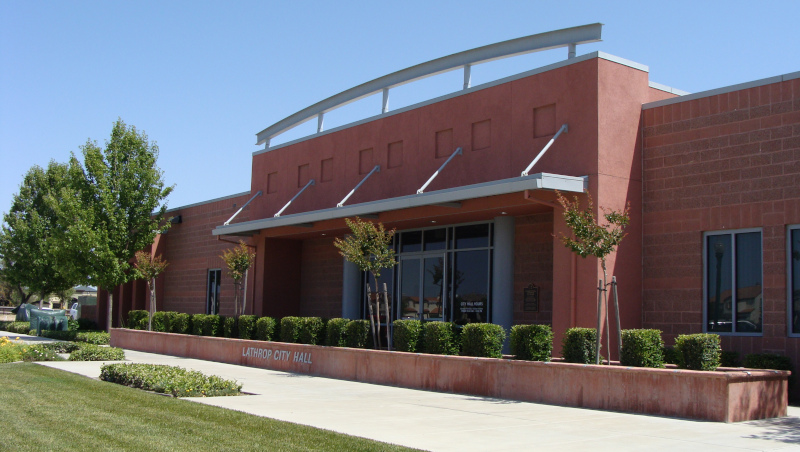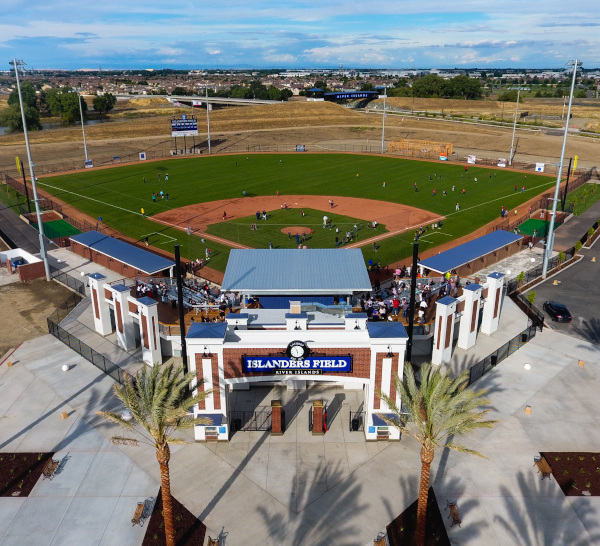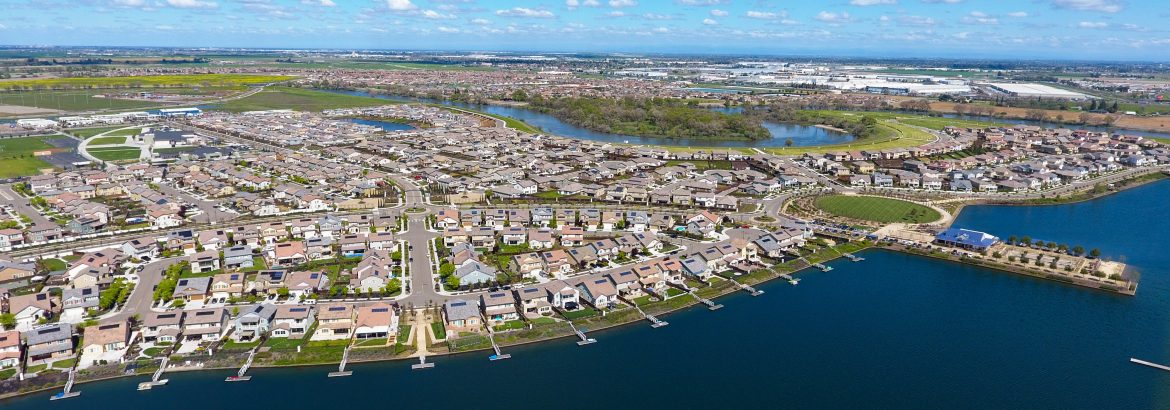Lathrop, California
A choice community
Business View Magazine interviews representatives from Lathrop, CA, as part of our focus on best business practices of American cities.
The City of Lathrop is located in San Joaquin County, in Northern California, 70 miles east of San Francisco. The 23-square-mile city is at the intersection of the I-5 (one of the major freeways in California and the major north-south freeway along the entire west coast) and SR120 freeways. Lathrop is located in the metro triangle bounded by the Bay Area, Stockton, and Sacramento, and is centrally located within a 30-minute commute of Tracy, Manteca, Stockton, Lodi, Modesto, Livermore, and Pleasanton.
Lathrop was platted when the railroad was extended to that point. In September 1869, four months after the railheads of the transcontinental railroad met at Promontory, Utah, the completion of the San Joaquin River Bridge at Mossdale Crossing at Lathrop actually completed the west coast link. A post office has been in operation at Lathrop since 1871. The city was named for the maiden name of the wife of Leland Stanford.
The City of Lathrop is served by the San Joaquin Regional Transit District and the Altamont Commuter Express (ACE) train. Over 80,000 vehicles per day commute over the Altamont Pass into the Bay Area for employment. There is a strong demand for housing from the Bay Area, and as residents are moving to affordable places, Lathrop is in the midst of becoming Northern California’s fastest growing and most comprehensive Master Planned Community. Lathrop’s population was 18,023 at the 2010 census, with current figures closer to 25,000, and a projected “build out” population of 70,000. The City of Lathrop has a 15 minute drive time, daytime population of 289,775 with an average household income of $74,229. Lathrop is strategically centered between the Stockton, Modesto, and Tracy submarkets – all within a 20-mile radius – with a combined current population of nearly 750,000, and an expectation that this number will approach one million within ten years.
Susan Dell’Osso is President of River Islands, a 5,000-acre Master Planned development wholly within the City of Lathrop. “We are planned for 11,000 housing units,” she explains. “Only about 1,200 are occupied, so far. We’re building about 500 units a year, and they’re all different kinds – everything from apartments to executive houses on the water with docks. It’s ultimately about 40,000 people, so you can imagine it’s just a wide range of housing types. But, more importantly, we have a large business park of 400 acres that’s slated for about five million square feet of space, hosting 17,000 jobs. This was part of a citizens’ initiative that got approved in 2000. We have strictly prohibited warehousing and industrial development within that business park, so it’s all slated for commercial use. The target is 40 employees per acre. Unless we go back to another vote of the people, we will not be able to put a big warehouse with few employees in there. Our intent is to be a replica of Bishop Ranch Business Park Development (San Ramon, CA) or Huffman (Anchorage, AK).”

Also voted in, as part of that 2000 initiative, was an economic development fee paid by home builders. Upon closing a home, the home builder pays $5,000 in fees to River Islands, which then transfers it to the City of Lathrop, to be held in an escrow account, and only used to entice employers into the business park. Technically, 80 percent must be used exclusively on River Islands; the balance of 20 percent may be used anywhere in the city, as long as it’s for economic site development. “Over time, the 11,000 homes will generate about $55 million in fees,” says Dell’Osso, “so it’s quite a nice financial incentive for an employer to locate here.”
Lathrop has a huge resident population that commutes over to the Bay Area every day. Valley Link is a new rail system that will be put in place for public transit to connect directly to the San Francisco Bay Area BART (Bay Area Rapid Transit System).
The Valley Link is similar to the eBART (East Contra Costa County BART extension) that’s going on in Pittsburg and Antioch, a train system that that goes down existing rails but would connect, exactly, at the platform. In Lathrop’s case, it would connect from River Islands and other parts of Lathrop to Tracy, at the Dublin Station. The Valley Link would go right down the median of the freeway, over the Altamont Pass, down I-580, and stop at the Dublin BART station; people would be able to get off and walk across to BART without taking a bus – literally a platform-to-platform connection.
“That is super critical for our residents, but also will be really critical to start the business park going,” says Dell’Osso. “We are shovel-ready in our business park. We have water, sewer – we are essentially ready to go. All the zoning is in place; all the environmental reviews are in place. But having that reverse commute for employers would be a tremendously valuable thing.”
River Islands has its own Irrigation District, which provides all the electricity, eliminating the need for PG&E to provide electrical services. “We have the ability to do a lot of renewable resource development. Right now, we’re working on the community solar program,” says Dell’Osso. “There’s a requirement for home builders to put solar on every home. Well, we’re actually talking about making it much more efficient by doing a community solar program, where the homebuilders get credit for the solar in an off-site location, which is in the boundaries of River Islands but not on the individual houses. That’s a very green alternative to individual home solar. We also have extensive use of swales. Our storm water goes to swales before going into a lake with a sandy bottom and is infiltrated out into the river system around us, much cleaner than when the agricultural outflow goes out.”
River Islands is building enough infrastructure for 500 homes a year, at about $120 million a year in infrastructure construction; everything from assisting the city in building wastewater treatment facilities, to building new schools, to building in-tract streets. “We have a significant amount of investment going on in the community,” Dell’Osso explains. “We try to hire locally for all of our employees who will work on the different construction items. It’s not always doable, but a lot of people are able to stay in this location because of the jobs that have been created out here. There’s about 80,000 people that commute over the Altamont Pass from our region every single day, so the employment park that we’re building, the infrastructure that we’re building, all these jobs that are being created, we think are very important to keep those employees here where they live.”
Dell’Osso notes, “We have a Valley Link station proposed for River Islands, right along the boundary of the employment center that could be a transit-oriented development. We haven’t finalized the number yet, but we think we’re going to have anywhere between 1,250 to 1,500 apartments and condominiums along that corridor, so we’re trying to identify the residential opportunities around the transit.”
Shelley Burcham, City of Lathrop Economic Development Administrator, adds, “The Valley Link rail provides opportunity for businesses in the Silicon Valley or San Francisco Bay area to open a satellite office or an office over in this region so we can get some of their commuter workforce off the road. They can work more locally, yet they have immediate access to the San Francisco Bay area, back to their headquarters if they need to. I think Valley Link will be a critical component for public transit.”
In April 2014, electric car maker, Tesla Motors (based in Palo Alto, CA, about an hour southwest) announced that it would be opening a factory in Lathrop in a 430,000-sq.-ft. facility that was once a Daimler-Chrysler parts distribution center. Other Lathrop-based companies include Home Depot, Del Monte Foods, In-N-Out Burger, and Wayfair. UPS also has its regional distribution center there, and there’s access to freight rail through the Union Pacific intermodal system located within the region. Burcham states, “We have two new industrial parks. One is building 4.85 million square feet within ten buildings; that’s called Tri Point Logistics Center, where Wayfair will be its first tenant. Then, we have another new industrial park, Lathrop Gateway Business Park, with three million square feet and 10 buildings. So in addition to what Susan is talking about with the business center, we do have the industrial portion as well.”
Mossdale Village, which abuts the site of the San Joaquin River Bridge, and is located west of I-5 and east of the San Joaquin River, consists of 2,375 units currently under construction as a master planned community, and includes 27 acres of freeway commercial zoning, with Target anchoring nearly one million square feet of retail/office space.

Mark Meissner, City of Lathrop Community Development Director, elaborates, “Lathrop has done a really good job in establishing master-planned areas. So along with the River Islands development, we also have a development that has been around for a while called the Central Lathrop Specific Plan, on a 1,540-acre site west of I-5, with plans for up to 6,800 dwelling units, including low density, medium density, and high density, a power center, and other retail uses along I-5, nearly 4.5 million square feet of office/commercial space, with substantial recreation and open space areas that will be included within that development along the river. We have several apartment complexes that are approved and nearing the development stages. One of them is our Town Center Apartments, located adjacent to commercial areas, so each of these apartment dwellers will have easy, walkable access to commercial uses and shopping centers.”
According to Burcham, “A lot of the folks commuting locate here because they are able to afford the homes. People working in the San Francisco Bay area, when they’re young, it’s exciting to be over there. But once they start to build a family, and want to settle down, and purchase a home, and have good schools, they have to locate east of the San Francisco Bay area, which would be right in our area, hence more affordable housing and development.”
Meissner adds, “There’s more affordable development being established here with these apartment complexes. The total for the Town Center Apartments is 146 units. The Mossdale Apartments project that’s nearing development stages has 204 dwelling units. So, that will add to the type of housing we have available here in Lathrop.”
Principal Planner, Ricardo Caguiat, mentions that the California Department of Finance recently released its housing report. “We’re pretty proud of a couple of things,” he notes. “The City of Lathrop, in terms of population growth from housing production not related to wildfires, grew 5.2 percent, the number one top city in the state in terms of population growth. The city also ranked number two in the state for the percent of total housing unit growth. There’s a desperate need for housing in California, so we’re doing our part to help in that effort.”
“We are located in an area where anybody traversing to Yosemite, the Sierras or Lake Tahoe has to come through our area; same if they’re coming from or going to the Bay Area, or Los Angeles. That’s why a lot of the logistics and manufacturing companies choose to come here because they are able to meet the just-in-time delivery needs of their consumers or customers,” according to Burcham.
Caguiat adds, “Our location is conducive to and a prime location for logistics. eCommerce is booming, thus the seven million square feet or so of industrial currently planned in our city for logistics. We have the Union Pacific intermodal station about two miles northeast of the city, a regional metropolitan airport just north of our city in Stockton, a deepwater channel port about 7-8 miles north of us, and, of course, Interstate 5 and State Route 99. So we have roads, rail, air, and port.”
“In addition,” says Burcham, “we realize unemployment rates are at an all-time low. Because we value our companies and want to make sure they remain in our areas and have a steady supply of workforce, our region is creating an apprenticeship program to engage high school students with employers. We have a career pathway for healthcare, a big industry in the region. We also have a career pathway that we’re starting for transportation, distribution, and logistics. So, we’re very in-tune with what our employers need, and we’re in the process of developing a workforce pipeline for them.”
Finally, Burcham points out, “Lathrop became incorporated in 1989, so we don’t have the downtown that some of the older cities do. I think it’s important to note that it’s not necessarily all about redevelopment here as much as establishing who we are.”
Lathrop is experiencing a unique opportunity to plan and manage its future development in a manner seldom available to other communities in Northern California. A city at the cusp of extensive residential and commercial growth, Lathrop has established a desirable balance between quality living and quality growth, carefully maintained through long-term planning and fiscal responsibility. Lathrop is a family-friendly city with excellent schools and an exciting parks & recreations department, and is confident in its growing role as a choice community for raising families and building businesses.
AT A GLANCE
WHO: Lathrop, California
WHAT: A city of 23,000
WHERE: In San Joaquin County, 70 miles east of San Francisco.
WEBSITE: www.ci.lathrop.ca.us
PREFERRED VENDORS
River Islands Business Park – riverislands.com
River Islands is Northern California’s premier mixed-use master planned community. Its owner and developer, the privately held Cambay Group, has invested almost 30 years into the successful assembly of approximately 5,000 acres of land into single ownership, the attainment of entitlements from city, state and Federal government agencies, and the creation of the backbone infrastructure necessary to bring the project to market.
The River Islands master plan, at build-out, at a glance:
- 11,000 residences, including rental, single family and multifamily units
- Hundreds of acres of parks, lakes and recreational amenities
- 350 acres for 5 million square feet of space dedicated to R&D, campus and office space
- A downtown retail district, now in the planning
- As many as nine schools, offering a top level educational experience for students from kindergarten through high school
- A proposed future transit station for high speed rail to the Bay Area
Located in San Joaquin County, the River Islands Business Park benefits from its geography, roughly equidistant from Sacramento, San Francisco and San Jose. River Islands is just an hour away from California state capital in Sacramento, the San Francisco Bay Area and the Silicon Valley.
Crow Holdings Industrial – www.crowholdings.com/chi
TriPoint Logistics Center is the premier, master-planned industrial park in Northern California. The 275 acre site is fully-entitled and capable of providing 4.85 million square feet of Class ‘A’ space suited for e-commerce, logistics, advanced manufacturing, light industrial and distribution facilities. The park has tremendous visibility with freeway frontage at the confluence of I-5 and Highway 120, which offers unique branding opportunities for tenants. Immediately accessible via a full interchange at Yosemite Avenue, the project provides excellent access to key transportation arteries serving California and the 13 state Western Region via Interstates 5, 205, and 80, and U.S. Highways 99 and 120.
Crow Holdings Industrial (CHI) is a national developer of warehouse, distribution, and manufacturing properties in key markets throughout North America. CHI is part of Crow Holdings, a privately owned real estate investment and development firm with a 70-year history and a proven track record of performance and innovation. With the construction of a single warehouse in 1948, Trammell Crow established an enduring enterprise. The founding principles of partnership, collaboration, and alignment of interests remain central to the operations of the Crow Holdings businesses today.
For more information, please visit crowholdings.com/chi or contact Phil Prassas at pprassas@chindustrial.com





